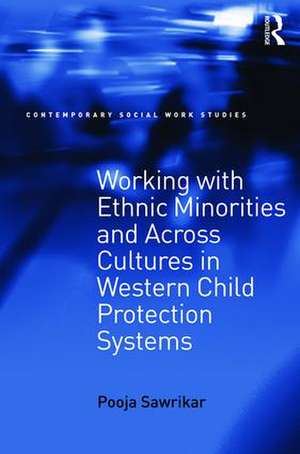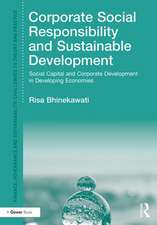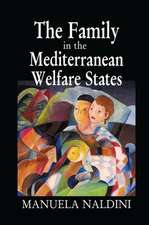Working with Ethnic Minorities and Across Cultures in Western Child Protection Systems: Contemporary Social Work Studies
Autor Pooja Sawrikaren Limba Engleză Paperback – 8 dec 2016
Unlike previous research, this book addresses discrete and relevant practice issues - how to work effectively with interpreters, whether or not to match caseworkers and clients based on ethnic background and what to consider when making plans for children in the out-of-home-care (OOHC) system - with best practice guidelines. This book will be required reading for all social work students, academics and practitioners whose work engages with issues of cultural competency.
| Toate formatele și edițiile | Preț | Express |
|---|---|---|
| Paperback (1) | 317.50 lei 6-8 săpt. | |
| Taylor & Francis – 8 dec 2016 | 317.50 lei 6-8 săpt. | |
| Hardback (1) | 765.84 lei 6-8 săpt. | |
| Taylor & Francis – 16 dec 2016 | 765.84 lei 6-8 săpt. |
Preț: 317.50 lei
Preț vechi: 371.06 lei
-14% Nou
Puncte Express: 476
Preț estimativ în valută:
60.75€ • 63.60$ • 50.27£
60.75€ • 63.60$ • 50.27£
Carte tipărită la comandă
Livrare economică 05-19 aprilie
Preluare comenzi: 021 569.72.76
Specificații
ISBN-13: 9781138225848
ISBN-10: 1138225843
Pagini: 264
Ilustrații: 3 Line drawings, black and white; 7 Tables, black and white; 3 Illustrations, black and white
Dimensiuni: 156 x 234 x 15 mm
Greutate: 0.39 kg
Ediția:1
Editura: Taylor & Francis
Colecția Routledge
Seria Contemporary Social Work Studies
Locul publicării:Oxford, United Kingdom
ISBN-10: 1138225843
Pagini: 264
Ilustrații: 3 Line drawings, black and white; 7 Tables, black and white; 3 Illustrations, black and white
Dimensiuni: 156 x 234 x 15 mm
Greutate: 0.39 kg
Ediția:1
Editura: Taylor & Francis
Colecția Routledge
Seria Contemporary Social Work Studies
Locul publicării:Oxford, United Kingdom
Public țintă
Professional Practice & DevelopmentCuprins
Introduction: What is in this book and who should use it Methodology: The Study on Which this Book is Based
Part I: Setting the Scene
1. Defining and Understanding the Client Group – Who are Ethnic Minorities and What do they Characteristically have in Common?
2. The Theoretical Backdrop – Why is it Important to Work Effectively with Ethnic Minorities and Across Cultures in Western Child Protection Systems?
Part II: Practice Issues
3. Frequency of Maltreatment – What are the Most Common Types of Abuse and Neglect Reported across Cultures and What is their Effect on Children?
4. Culture and Maltreatment – Are Physical Abuse, Sexual Abuse, Emotional Abuse, Inadequate Supervision and Neglect of Basic Needs Related to Culture?
5. Common Risk Factors of Maltreatment – Are Domestic Violence, Alcohol and Other Drug Issues, Mental Health Issues in the Carer, Housing and Financial Issues Related to Culture?
6. Protective Factors – Acknowledging Strengths of Families across Cultures Chapter
7. Working Effectively with Interpreters Chapter
8. To Match or Not To Match? The Pros and Cons of Ethnic Dis/Similarity between Client Families and Caseworkers
9. Ethnic Minority Children in the Out-Of-Home Care (OOHC) System – How do they Fare Compared to Aboriginal and Anglo Children?
Part III: Wrapping Up
10. Summarising the Main Causes of Entry of Ethnic Minorities in Western Child Protection Systems – What’s Cultural and What Isn’t?
11. Getting it Right – Personal, Organisational and Institutional Characteristics of Cultural Competency
12. Conclusion and Where to from Here?
Part I: Setting the Scene
1. Defining and Understanding the Client Group – Who are Ethnic Minorities and What do they Characteristically have in Common?
2. The Theoretical Backdrop – Why is it Important to Work Effectively with Ethnic Minorities and Across Cultures in Western Child Protection Systems?
Part II: Practice Issues
3. Frequency of Maltreatment – What are the Most Common Types of Abuse and Neglect Reported across Cultures and What is their Effect on Children?
4. Culture and Maltreatment – Are Physical Abuse, Sexual Abuse, Emotional Abuse, Inadequate Supervision and Neglect of Basic Needs Related to Culture?
5. Common Risk Factors of Maltreatment – Are Domestic Violence, Alcohol and Other Drug Issues, Mental Health Issues in the Carer, Housing and Financial Issues Related to Culture?
6. Protective Factors – Acknowledging Strengths of Families across Cultures Chapter
7. Working Effectively with Interpreters Chapter
8. To Match or Not To Match? The Pros and Cons of Ethnic Dis/Similarity between Client Families and Caseworkers
9. Ethnic Minority Children in the Out-Of-Home Care (OOHC) System – How do they Fare Compared to Aboriginal and Anglo Children?
Part III: Wrapping Up
10. Summarising the Main Causes of Entry of Ethnic Minorities in Western Child Protection Systems – What’s Cultural and What Isn’t?
11. Getting it Right – Personal, Organisational and Institutional Characteristics of Cultural Competency
12. Conclusion and Where to from Here?
Notă biografică
Pooja Sawrikar is Postdoctoral Fellow in Social Policy at Griffith University, Australia.
Descriere
Multiculturalism in western countries continues to grow, but responsiveness to it with culturally sensitive research, policy and practice has been slower to develop. Unlike previous research, this book addresses discrete and relevant practice issues - how to work effectively with interpreters, whether or not to match caseworkers and clients based on ethnic background, and what to consider when making plans for children in the out-of-home-care system - with best practice guidelines.




































